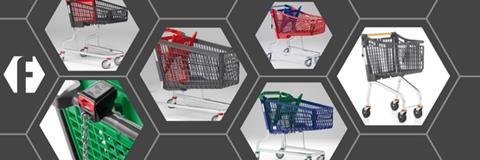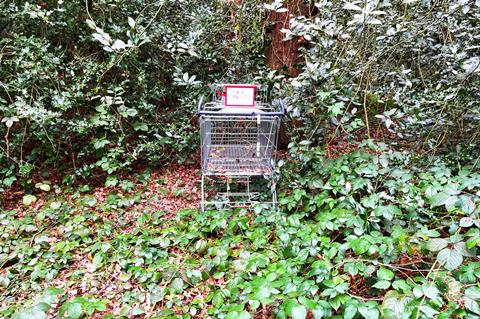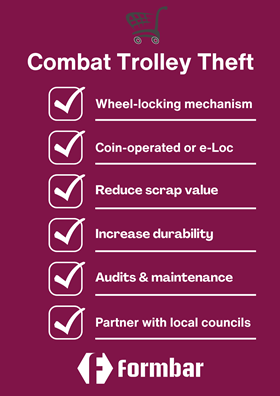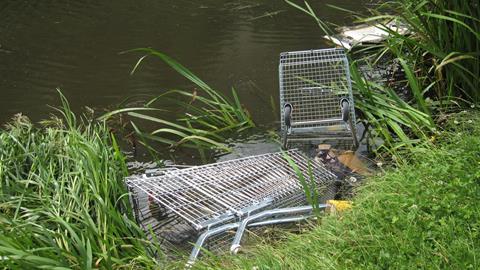Trolley theft in the UK is a growing issue, causing significant financial losses and environmental impact for retailers. Innovative solutions, such as hybrid trolleys and advanced security systems, offer a way to reduce theft while supporting sustainability goals.
Shopping trolleys are essential to the retail experience, yet they often become targets for theft, leading to significant financial losses and operational challenges. In the UK, trolley theft remains a pressing issue. For example, Asda’s Bromsgrove store reported the theft of 320 trolleys in one year, costing £32,000 in replacement fees due to each trolley being valued at £100.
Understanding the root causes of trolley theft
The motivations behind trolley theft vary. For traditional all-metal trolleys, the high value of scrap metal is a key driver. These trolleys are often stripped and sold to scrap merchants. Some stores experience wholesale metal theft, with all trolleys loaded into a truck overnight from the car park trolley shelters. Additionally, opportunistic theft occurs when customers use trolleys to transport shopping home and fail to return them. Teenage pranks, such as trolley races, can also lead to abandonment and damage.
British Retail Consortium Crime Survey 2024 reported that shoplifting has also soared to unprecedented levels, with losses to retailers doubling in the last year to £1.8bn – the highest ever – up from £950m.
While shoplifting remains the most visible form of theft, ancillary losses like stolen trolleys contribute significantly to operational costs. The rising value of scrap metal has made traditional all-metal trolleys a prime target for thieves looking for quick profits.
The British Metals Recycling Association (BMRA) has reinforced to its members that it is illegal to sell shopping trolleys to scrap metal merchants. Trolleys remain the property of the supermarket or shop they originate from, and the UK government provides extensive guidance on managing abandoned trolleys responsibly.

Blending sustainability with theft prevention
One way to combat this problem, while aligning with sustainability goals, is by rethinking trolley design. Hybrid trolleys, which combine plastic baskets with a metal chassis, have been adopted by many retailers to address theft. With less than half the metal content of traditional trolleys, they are significantly less attractive to thieves targeting them for scrap value. At the same time, the plastic components can be manufactured using recycled materials, supporting eco-friendly practices.
”Retailers like Mercadona in Spain have seen a dramatic 80% reduction in trolley replacement needs after introducing hybrid trolleys and implementing security systems that prevent trolleys from being pushed beyond car parks”

Hybrid trolleys not only deter theft but also offer features that make them more practical for modern retailers. The use of UV-resistant plastics ensures they withstand harsh weather conditions if left outside, while ergonomic designs minimise damage to fixtures and vehicles. With options to incorporate recycled materials, they are a forward-thinking solution for eco-conscious retailers. The plastic can also be coloured to reflect the store brand, meaning trolleys really stand out in car parks and the local area when looking for them to return to trolley storage.
Retailers like Mercadona in Spain have seen a dramatic 80% reduction in trolley replacement needs after introducing hybrid trolleys and implementing security systems that prevent trolleys from being pushed beyond car parks. These systems effectively target both wholesale and opportunistic theft while reducing environmental impact by decreasing the need for replacements.
Practical steps for reducing trolley theft
While innovative trolley designs offer a robust solution, combining them with operational strategies enhances effectiveness. Wheel-locking mechanisms, for instance, prevent trolleys from leaving store premises. When paired with good storage practices, such as ensuring all trolleys are secured indoors overnight, these systems deter theft while protecting assets.
Other measures include the use of coin-operated locks to encourage shoppers to return trolleys to designated storage areas, preventing them from being left scattered around the car park. Trolley shelters also keep trolleys secure and accessible while protecting them from damage.
A more advanced solution is a Smart Lock, a lock that requires a phone app to unlock the trolley, assigning it to an individual known shopper. This innovative system not only deters theft but also enhances accountability. Contact Formbar for more information.
Maintaining high-quality trolleys is also critical. Regular maintenance and inspections extend their lifespan, reducing both environmental waste and replacement costs. Durable designs integrate ergonomic, UV-resistant plastics with sturdy metal frames, ensuring trolleys can withstand years of use in busy retail stores.
Every stolen or abandoned trolley represents more than just a financial loss – it also carries an environmental cost. Producing and transporting new trolleys consumes significant resources, from the energy required to shape metal or mould plastic to the fuel used in transportation. By addressing theft and through regular maintenance, supermarkets can directly reduce their carbon footprint.

Engaging with customers and communities
Customer education plays a vital role in combating trolley theft. Many shoppers are unaware of the financial and environmental costs associated with stolen or abandoned trolleys. Signage within stores and social media campaigns can raise awareness about the importance of trolley care.
Furthermore, collaborating with local authorities and community groups can help track down stolen trolleys and deter organised theft. Some councils in the UK have introduced fines for abandoning trolleys, providing additional incentives for responsible usage. However, they will also charge your store for returning abandoned trolleys.
Working alongside councils can yield long-term benefits. Some councils, like those in Birmingham and Manchester, have implemented recycling initiatives to return abandoned trolleys to stores while encouraging retailers to invest in anti-theft technology. Such programmes demonstrate the power of community partnerships in addressing shared challenges.
Striking a balance between security and sustainability
Retailers face the challenge of addressing trolley theft while meeting sustainability targets, keeping the bottom line in full view. Hybrid trolleys, regular maintenance, and advanced security measures offer a balanced approach that reduces losses and aligns with eco-conscious goals. By incorporating recycled materials and extending trolley lifespans, businesses can minimise their environmental impact and demonstrate their commitment to sustainability.
Tackling trolley theft doesn’t just protect profits; it also sends a message to customers that their shopping experience – and the planet – matters to you.
Summary
Retailers looking to combat trolley theft can follow these key steps:

● Introduce wheel-locking mechanisms to prevent trolleys from leaving premises or coin-operated locks
● Consider a Smart Lock advanced solution with a phone app
● Invest in plastic hybrid trolleys to reduce scrap value and increase durability
● Conduct regular audits and maintenance to ensure trolleys remain in good condition
● Educate customers about the costs and consequences of trolley misuse
● Partner with local councils to retrieve abandoned trolleys and share best practices.
For sustainable trolley options, maintenance and security solutions, visit Formbar.co.uk.






















